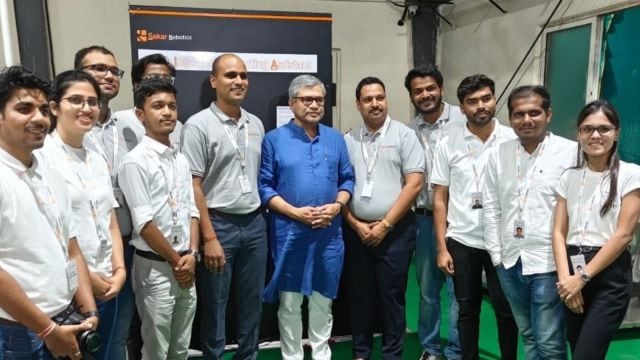Click here to join Express Pune WhatsApp channel and get a curated list of our stories
Why the Indian Railways is rooting for this Pune startup
The technology, LISA, has finished its first pilot installation at Ghorpadi Yard
 We are proud to announce the launch of our Linen Inspection & Sorting Assistant (LISA) machine inaugurated by Hon.
@RailMinIndia
Shri
@AshwiniVaishnaw
Ji in the presence of
@GM_CRly
Shri Ram Karan Yadav Ji &
@drmpune
Shrimati Indu Rani Dubey Ji (x/sakarrobotics)
We are proud to announce the launch of our Linen Inspection & Sorting Assistant (LISA) machine inaugurated by Hon.
@RailMinIndia
Shri
@AshwiniVaishnaw
Ji in the presence of
@GM_CRly
Shri Ram Karan Yadav Ji &
@drmpune
Shrimati Indu Rani Dubey Ji (x/sakarrobotics)There is an experience that travellers on trains cherish almost as much as looking out the window at the flitting scenery or sampling the fare at stations. It is the pleasure of tucking as the rhythm of the moving train lulls one to sleep.
It was the same with Manoj Pochat, co-founder and chairman of Pune-based Sakar Robotics. But, when he travelled by train, one of the things that made him lose sleep, literally, was stained or defective bed linen. “A passenger will not use the bedsheet because there’s something in their mind that it is not properly cleaned since the stains are still visible,” says Pochat.
 Indu Dubey, the Divisional Railway Manager of Pune Division, would tell Pochat that stained or torn bed sheets were a persistent problem among travellers and the Indian Railways. After conversations and consultations, Sakar Robotics decided to work on a solution.
Indu Dubey, the Divisional Railway Manager of Pune Division, would tell Pochat that stained or torn bed sheets were a persistent problem among travellers and the Indian Railways. After conversations and consultations, Sakar Robotics decided to work on a solution.
The company, whose co-founder, Managing Director and CEO Karan Patil, is an award-winning geek, got together with the team and created an AI-based automation machine that inspects bed sheets used by the Indian Railways, rejects those that do not meet standards, and ensures 100 per cent quality check.
Called Linen Inspection and Sorting Assistant (LISA), the technology finished its first pilot installation at the Ghorpadi Yard in Pune Railway Division. Union Railway Minister Ashwini Vaishnav inaugurated the technology on July 20.
“LISA inspects each and every bedsheet for defects, stains or damages. Its introduction is helping the railways achieve higher efficiency in their linen management process,” says Pochat.
Sakar Robotics was set up in 2023 with the aim to leverage the power of AI and automation to eradicate pain points in different industries. “When we started out, it was with our own funds as the initial investment. We were very clear that our investment was limited and it should be utilised properly. We utilised the money to identify clear pain points of customers. We searched for a good problem to solve and also identified the market for it. So, the initial money was not utilised in immediately jumping to products,” says Patil.
Their first product was a “human detection system” that addresses a common apprehension among people who work with robots that are getting smarter and not-very-friendly-looking with every upgrade. Sakar has prepared a vision-based module that can be installed in a robot to enable it to detect a human presence and respond to it with different kinds of actions, which includes slowing down and stopping. Another use for this is in material handling and logistics, where human presence is not required or banned.
Another path-breaking product that will hit the market towards the end of this year happened after conversations with the construction industry, when it was found that labour cost and scarcity was delaying projects. “We came up with the idea that we can provide a robot which can do plastering and painting of a wall. Sure, there are solutions available worldwide, in countries, such as China and Canada, but most of these are not completely autonomous. With the help of various industry and subject matter experts, we came up with our product that will help the construction industry,” says Pochat.
Click here to join Express Pune WhatsApp channel and get a curated list of our stories








